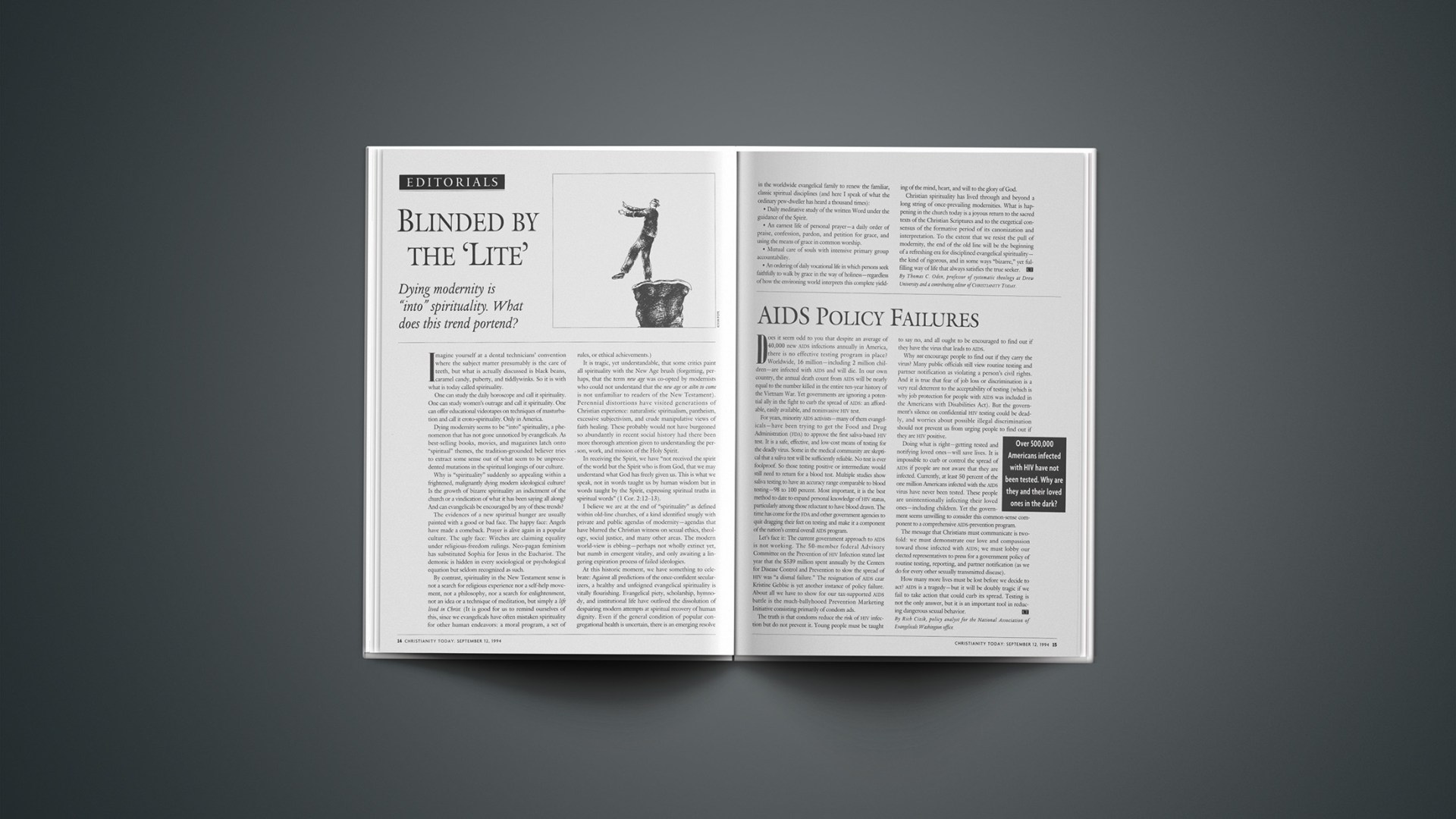Imagine yourself at a dental technicians’ convention where the subject matter presumably is the care of teeth, but what is actually discussed is black beans, caramel candy, puberty, and tiddlywinks. So it is with what is today called spirituality.
One can study the daily horoscope and call it spirituality. One can study women’s outrage and call it spirituality. One can offer educational videotapes on techniques of masturbation and call it eroto-spirituality. Only in America.
Dying modernity seems to be “into” spirituality, a phenomenon that has not gone unnoticed by evangelicals. As best-selling books, movies, and magazines latch onto “spiritual” themes, the tradition-grounded believer tries to extract some sense out of what seem to be unprecedented mutations in the spiritual longings of our culture.
Why is “spirituality” suddenly so appealing within a frightened, malignantly dying modern ideological culture? Is the growth of bizarre spirituality an indictment of the church or a vindication of what it has been saying all along? And can evangelicals be encouraged by any of these trends?
The evidences of a new spiritual hunger are usually painted with a good or bad face. The happy face: Angels have made a comeback. Prayer is alive again in a popular culture. The ugly face: Witches are claiming equality under religious-freedom rulings. Neo-pagan feminism has substituted Sophia for Jesus in the Eucharist. The demonic is hidden in every sociological or psychological equation but seldom recognized as such.
By contrast, spirituality in the New Testament sense is not a search for religious experience nor a self-help movement, not a philosophy, nor a search for enlightenment, not an idea or a technique of meditation, but simply a lift lived in Christ. (It is good for us to remind ourselves of this, since we evangelicals have often mistaken spirituality for other human endeavors: a moral program, a set of rules, or ethical achievements.)
It is tragic, yet understandable, that some critics paint all spirituality with the New Age brush (forgetting, perhaps, that the term new age was co-opted by modernists who could not understand that the new age or aion to come is not unfamiliar to readers of the New Testament). Perennial distortions have visited generations of Christian experience: naturalistic spiritualism, pantheism, excessive subjectivism, and crude manipulative views of faith healing. These probably would not have burgeoned so abundantly in recent social history had there been more thorough attention given to understanding the person, work, and mission of the Holy Spirit.
In receiving the Spirit, we have “not received the spirit of the world but the Spirit who is from God, that we may understand what God has freely given us. This is what we speak, not in words taught us by human wisdom but in words taught by the Spirit, expressing spiritual truths in spiritual words” (1 Cor. 2:12-13).
I believe we are at the end of “spirituality” as defined within old-line churches, of a kind identified snugly with private and public agendas of modernity—agendas that have blurred the Christian witness on sexual ethics, theology, social justice, and many other areas. The modern world-view is ebbing—perhaps not wholly extinct yet, but numb in emergent vitality, and only awaiting a lingering expiration process of failed ideologies.
At this historic moment, we have something to celebrate: Against all predictions of the once-confident secularizers, a healthy and unfeigned evangelical spirituality is vitally flourishing. Evangelical piety, scholarship, hymnody, and institutional life have outlived the dissolution of despairing modern attempts at spiritual recovery of human dignity. Even if the general condition of popular congregational health is uncertain, there is an emerging resolve in the worldwide evangelical family to renew the familiar, classic spiritual disciplines (and here I speak of what the ordinary pew-dweller has heard a thousand times):
* Daily meditative study of the written Word under the guidance of the Spirit.
* An earnest life of personal prayer—a daily order of praise, confession, pardon, and petition for grace, and using the means of grace in common worship.
* Mutual care of souls with intensive primary group accountability.
* An ordering of daily vocational life in which persons seek faithfully to walk by grace in the way or holiness—regardless of how the environing world interprets this complete yielding of the mind, heart, and will to the glory of God.
Christian spirituality has lived through and beyond a long string of once-prevailing modernities. What is happening in the church today is a joyous return to the sacred texts of the Christian Scriptures and to the exegetical consensus of the formative period of its canonization and interpretation. To the extent that we resist the pull of modernity, the end of the old line will be the beginning of a refreshing era for disciplined evangelical spirituality-the kind of rigorous, and in some ways “bizarre,” yet fulfilling way of life that always satisfies the true seeker.
********************
Thomas C. Oden is professor of systematic theology at Drew University and a contributing editor of CHRISTIANITY TODAY.
Copyright © 1994 Christianity Today. Click for reprint information.










